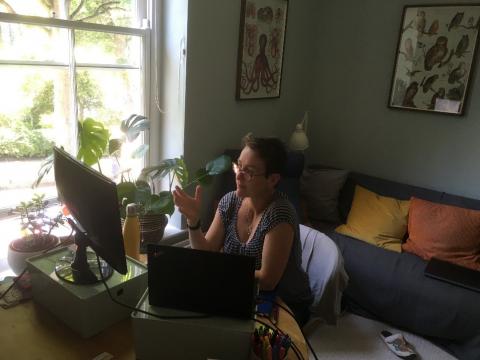UKCR co-Champion Kate Lonsdale and professional facilitator Penny Walker reflect on recent experience of online event design and facilitation
How did this come about?
 Kate Lonsdale: I had been looking forward to hosting a small, two-day event for policy, practice and academic colleagues whose work relates to building climate resilience. Decent thinking time had been in short supply so I was pleased that we’d made the case for a longer meeting and that it had generated interest. Then, of course, Covid-19 happened. Our commitment to our funders (University of Leeds) meant that abandoning or postponing were not options, so our only choice was to go online.
Kate Lonsdale: I had been looking forward to hosting a small, two-day event for policy, practice and academic colleagues whose work relates to building climate resilience. Decent thinking time had been in short supply so I was pleased that we’d made the case for a longer meeting and that it had generated interest. Then, of course, Covid-19 happened. Our commitment to our funders (University of Leeds) meant that abandoning or postponing were not options, so our only choice was to go online.
 Penny Walker: I’m a facilitator and a lot of the conversations I facilitate are related to the climate. Like everyone else, I’ve had to adapt my work to being entirely online, and I was a few weeks ahead of Kate and the team on that particular learning curve! Kate and I have worked together in the past, so we knew we could hit the ground running.
Penny Walker: I’m a facilitator and a lot of the conversations I facilitate are related to the climate. Like everyone else, I’ve had to adapt my work to being entirely online, and I was a few weeks ahead of Kate and the team on that particular learning curve! Kate and I have worked together in the past, so we knew we could hit the ground running.
What were we hoping to achieve?
Kate: Long before I became involved with the UK Climate Resilience programme I had been curious about the term ‘resilience’ in relation to climate change. I find it a slippery term – attractive and easy to get a sense of but also used in vague ways that, to my pragmatic mind, this provokes questions like – how is climate resilience actually being built? How are people making sense of this in strategy and decisions? Is it substantially different to adaptation?
Penny: As well as wanting to support the team reinvent this workshop as an online event, we wanted to use it as a live learning opportunity, building everyone’s skills and confidence to support the wider climate resilience community through brilliant online meetings.
What were we worried about?
Kate: How would I get the quality of thinking space needed to get into this complex subject in any useful depth? Also, as one of the aims of the programme is to build a coherent research and practice community on climate resilience, is it possible to create meaningful connections between people online? Especially between people who had never met before.
Penny: In our initial team workshop, people were also concerned about security (Zoom bombing) and about messing up during a live event. These are very real anxieties for lots of people who are doing more than a traditional webinar online, so if this team could overcome them then my hope is that their colleagues and wider networks can take those first steps. I was also keen to help the team match their ambition to the functionality of the online tools we were using – not too cautious, not too unrealistic.
What were we excited about?
Kate: As we were not going to need to pay for accommodation and food we had funds available for some expert mentoring support, in the form of Penny Walker. This event seemed like a perfect opportunity for Champion team learning about running online events. Covid-19 or not, developing our ability to thrive online makes sense for Net-Zero reasons also.
Penny: And in the facilitation community, lots of us are also trying to make the most of the necessity of getting good at online, for exactly the same reason.
What did we end up doing?
Kate: The biggest reshape was thus to move to a single morning session. This seemed to be the most we could expect people to commit to. I ran a number of interviews before the event with people coming to the workshop which helped me gather experience on the use of term ‘climate resilience’: what people understood it to mean, challenges in using it and how they put it into practice.
After a flurry of activity, playing with multiple online platforms (Miro, Mural, Menti, Collaborate to name but a few) we concluded that we should play it safe for our first event and keep things simple. We were used to Zoom and felt the polling, screen sharing and breakout room functions were all we needed, or certainly all we felt confident with given the time we had to prepare.
Penny: We also used google docs, one per breakout group, for the groups’ conversations to get captured in real time, in full view. This is the equivalent of writing on flip charts in a physical event.
How did it go?
Kate: After introductions where we trialled the polling and the breakout room functions in preparation for the exercises coming later, I talked through the findings of a set of interviews on the use of climate resilience and presented a ‘strawman’ list of possible attributes of climate resilience that were then discussed in 4 person breakout groups. A plenary discussion pulled out responses which, during a 20 minute break, were used to reshape the list and presented back to the group in the form of a poll to identify the top 5 attributes.
This formed the basis of the second round of breakout groups where prioritised attributes were used to think through how to build resilience in 5 different situations. This was drawn together in a final plenary session and the outputs of the workshop discussed before drawing the session to a close. We had a team reflection afterwards to draw out the key learning and reflect on feedback from the evaluation we did after the event.
What surprised us / what did we learn?
Kate: The time went very quickly and I was asking people to do something pretty complicated. It was good to have been able to do some of the work in advance through the interviews. The experience has made me think more carefully about what you do ‘synchronously’ (on the virtual space together) and ‘asynchronously’ (in advance of the meeting, in people’s own time). For example, it may be a better use of time to share annotated or audio recorded slides in advance of an online session than to use the session to present them ‘live’. Online space can then be saved for discussion about the slides and their implications – the ‘so what?’ and ‘now what?’ questions.
While it would have been good to have made more time for the breakout sessions, because of the knowledge and experience of the people in the room what came out was very useful, relevant and insightful. I since had experience of staying focussed in breakouts lasting over an hour if the group is small (some say 4 is the magic number) and motivated by the task.
Feedback after the event was overwhelmingly positive: e.g. “It was great to discuss in small groups – it felt like we got some of the benefit of seeing people ‘in-person’ even though we were on a video call.” And “Using Zoom was actually very good and makes me wonder how many of these type of events in future will actually be held in-person or continue virtually like this, regardless of the wider circumstances.“
As a facilitator used to ‘allowing things to emerge’, I struggled a little with the need to explain the breakout exercises in sufficient detail for my colleagues facilitating the breakout rooms. One of the good spin-offs of running online events with the additional time needed for more detailed design and more distributed facilitation across breakout groups was that it forced us to operate as a more coherent Champion team. This was a perfect learning experience and we have gone on to run webinars. I’m confident, next time we’d be up for something much more ambitious.
Penny: It confirmed for me that online events do need a high level of preparation, including contingency planning. Time spent planning and practising as a delivery team is essential. You also need to have someone in a tech ‘producer’ role, keeping an eye on things like launching polls or setting up breakout room. Having a backchannel for the team which is independent of your internet connection is also a great idea. We used WhatsApp.
Our tips for others
- Allow for event design stage to take more time
- Creatively mix synchronous and asynchronous activities to maximise the value of virtual time
- Expect to have more facilitators
- Rehearse!
- Keep it simple – but not too simple – and take some risks
- Invest in support
- Be prepared to learn
- Enjoy the learning process, and like a great improviser, delight in your mistakes!
Penny Walker specialises in facilitation for sustainability

